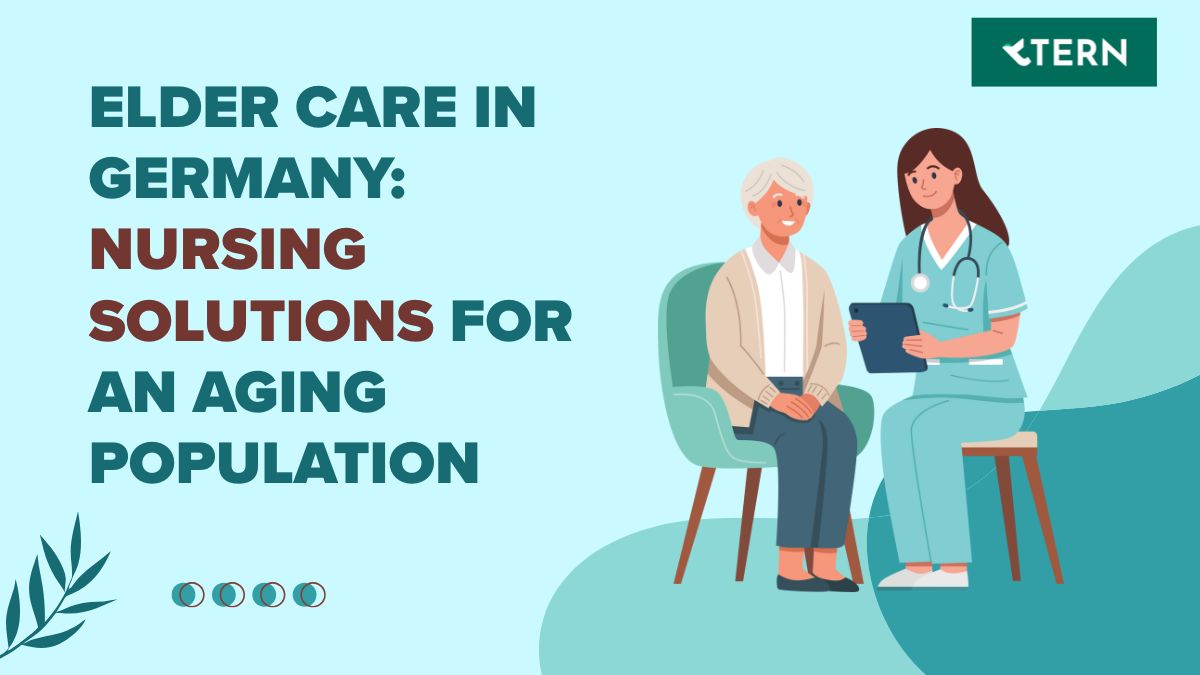Nursing in Germany
November 25, 2024
•
6 mins
Salary of a nurse in Germany: A comprehensive guide
.png)
Over the years, Germany has become an attractive destination for healthcare professionals, especially nurses who seek better career opportunities in the global healthcare sector. With stringent government oversight alongside joint self-government bodies like The Federal Joint Committee, Germany is renowned for its robust healthcare system. While being a decentralised and complex system, it is effective and efficient.
But moving to a new country is a significant decision that requires careful considerations like salary and career prospects that await. We have curated a comprehensive guide for you where we will delve into the intricacies of nurse salaries in Germany. With this guide, we aim to provide you with all the necessary information you might require to make an informed career decision before moving to Germany.
Overview of nursing in Germany
.png)
The healthcare system in Germany
Germany boasts one of the most efficient and well-structured healthcare systems. The country operates on a universal multi-payer healthcare system, combining statutory insurance (Gesetzliche Krankenversicherung) and private insurance (Private Krankenversicherung) options for its citizens. This ensures that all residents have access to high-quality medical care, creating a stable job market for healthcare professionals, including nurses.
Demand for nurses
.png)
With consistently growing demand for qualified nurses in Germany, the sector is expected to continue growing in the coming years. An aging population and advancements in medical technology have led to an increased need for skilled nursing professionals. According to reports, Germany faces a significant shortage of nurses, with estimates suggesting a need for an additional 150,000 nurses by 2025. Owing to this shortage, the Federal Employment Agency’s International Placement Services (ZAV) and the Deutsche Gesellschaft für Internationale Zusammenarbeit (GIZ) have been jointly running programs like the Triple Win Program to fulfill this demand sustainably since 2013. This shortage creates a favorable job market for both domestic and international nurses, offering numerous opportunities for career growth and job security.
Salary breakdown for nurses
Average Salary Range
.png)
The most crucial factor to understand for many when considering a nursing career in one of Europe’s powerhouses would be the salary of a nurse in Germany. The average nurse salary in Germany varies significantly based on several factors, but generally falls within a respectable range.
- Entry-level nurses: €2,500 - €3,000 per month
- Mid-career nurses: €3,000 - €4,000 per month
- Experienced nurses: €4,000 - €5,000+ per month
It is also important to note that these figures represent gross salaries and are pre-tax and deductions. The take-home pay will be lower due to a progressive tax system and mandatory social security contributions.
Factors influencing the salary of a nurse
.png)
Experience Level
Experience plays a significant role in determining a nurse’s salary in Germany, as it does with most professions globally. Newly qualified nurses typically start at the lower end of the salary scale. However, nurses can expect steady increases as they gain more experience and take on additional responsibilities.
Location
Employment location does impact the salary a nurse receives in Germany. Major cities like Munich, Frankfurt and Hamburg typically offer higher salaries to nurses compared to smaller towns or rural areas. However, it is essential to consider that the cost of living in these cities is also typically higher.
Specialisations
Nurses with additional qualifications or specialised skills often command higher salaries and growth prospects. The average annual salary of some high-paying specialisations includes:
- Nurse Anaesthetist - €132,000
- Intensive Care Nurse - €60,000
- Operating Room Nurse - €62,000
- Oncology Nursing - €60,000
- Psychiatric Nursing - €61,000
- Geriatric Nurse - €59,000
Nurses with advanced degrees such as a Master’s in Nursing or specialized certifications, can also expect higher compensation when applying to jobs.
Additional compensation and benefits
.png)
Bonuses and Allowances
Most healthcare facilities in Germany offer additional compensation on top of the base salary. These can include:
- Performance bonuses: Annual bonuses based on individual or team performance metrics are offered by many German healthcare facilities to reward nurses for exceptional care and efficiency.
- Shift differentials for night or weekend work: Nurses in Germany receive premium pay rates for less desirable shifts, such as nights, weekends or holidays.
- Holiday pay: German law mandates additional compensation for work on public holidays, typically at a rate of 1.5 to 2 times the regular hourly wage.
- Overtime compensation: For hours worked beyond their contracted amount, nurses in Germany are entitled to overtime pay, often at higher rates than regular hours.
- Profit-sharing: Some healthcare institutions, particularly private clinics offer profit-sharing schemes to their nurses offering a percentage of their annual profits as an incentive.
Benefits Package
It is typical for an employer in Germany to provide a comprehensive benefits package that can significantly enhance the overall salary package of a nurse. Some of the benefits include:
- Health insurance: German law mandates a contribution of 14.6% to statutory insurance, equally borne by the employee and employer. This ensures access to quality healthcare for the employee in their time of need.
- Pension contributions: Contributions to the state pension system are made at 18.6% and borne equally. This secures retirement benefits for the employee.
- Unemployment insurance: Both the employer and the employee contribute 1.2% each towards unemployment insurance amounting to 2.4% of the annual salary of the employee.
- Paid vacation: Nurses receive 30 days of paid vacation per year and sometimes more depending on their employer and collective agreements.
- Sick leave: Nurses in Germany are entitled to sick leave with continued pay for a certain period, typically up to six weeks for the same illness, after which health insurance benefits may apply.
- Professional development opportunities: Many healthcare employers in Germany offer ongoing training and educational programs for nurses, supporting them with career advancement and specialization.
Cost of Living in Germany
When considering career opportunities in Germany, another crucial aspect to evaluate is the cost of living in the city where you're applying for or accepting a job offer. With a high standard of living comes the expenses which can significantly vary depending on the location.
An Overview of the Cost of Living
.png)
Some of the major expenses for a nurse living in Germany typically include:
- Housing: Rent is usually the most significant expense incurred, especially in major cities. The average cost of a one-bedroom apartment is about €900 in major cities but can be availed at a subsidised cost for the first year.
- Food: Grocery prices are generally reasonable, with many affordable options available. You can expect to spend anywhere between €200 & €400 on groceries.
- Transportation: The public transport system in Germany is efficient and relatively affordable in most cities. Monthly travel passes generally go below €100
- Healthcare: Health insurance is mandatory in Germany where the employee and the employer contribute an equal percentage. This ensures that you have access to high-quality healthcare at reasonable costs.
View breakdown of cost of living of some of the cities in Germany - Berlin | Munich
Regional Differences
The cost of living can vary substantially between different regions in Germany:
- Major cities like Munich, Frankfurt, and Hamburg tend to have higher living costs, particularly for housing.
- Smaller cities and rural areas generally offer a lower cost of living and may have fewer job opportunities or lower salaries.
The average salary of a nurse in Germany is €37,000 per year which does vary depending on experience and location. The salary offered to a nurse in Germany is adequate to maintain a healthy standard of living in any city in Germany. Laws set in place by the government ensure fair compensation, prohibiting discrimination based on gender, race, religion, disability, age, and sexual orientation.
Comparing Salaries: Germany vs. Other Countries
International Comparison
When considering nursing jobs in Germany, it's helpful to compare salaries with other popular destinations for international nurses:
- United Kingdom: Like Germany, average salaries range from £24,000 to £37,000 per year.
- United States: Generally higher salaries, with averages ranging from $60,000 to $80,000 per year, but also higher living costs and less comprehensive social benefits.
- Canada: Comparable to Germany, with average salaries ranging from CAD 65,000 to CAD 85,000 per year.
Pros and Cons
Advantages of working as a nurse in Germany:
- Strong job security and numerous career opportunities
- Excellent work-life balance with regulated working hours
- Comprehensive social benefits and healthcare coverage
- High standard of living and quality of life
Potential challenges:
- Language barrier (proficiency in B2 German is usually required)
- Complex Visa and recognition process for non-EU nurses
- Higher tax rates compared to some other countries
Conclusion
For those considering nursing jobs in Germany, it's essential to weigh the salary against the cost of living, consider personal career goals, and factor in the quality of life offered. Germany presents an excellent opportunity for nurses looking to advance their careers in a supportive and professionally rewarding environment.
The salary of a nurse in Germany offers a competitive and comfortable standard of living, especially when considering the comprehensive benefits and job security. While salary may not be the highest globally, the overall package, including work-life balance and social benefits, makes Germany a great destination for nursing professionals.
Ready to take the next step in your nursing career? TERN is here to help you prepare for success in Germany! We offer personalised interview coaching and end-to-end support to ensure you're fully prepared to impress potential employers.
Let TERN guide you towards realising your dream of becoming a nurse in Germany. We're with you every step of the way!





%20(1200%20x%20630%20px)_page-0001.jpg)

